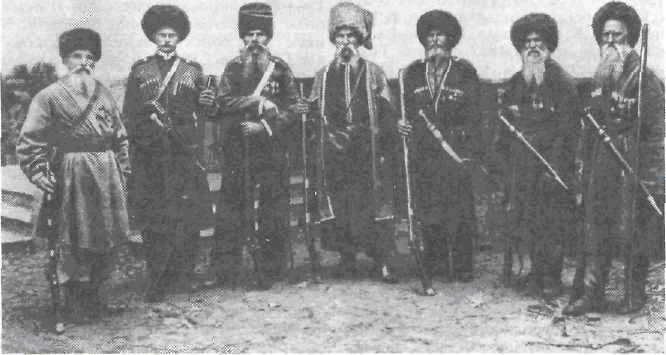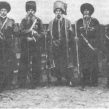
Cossacks versus Highlanders: Moscow Gambles on Tsarist Tactics in the North Caucasus
Publication: Eurasia Daily Monitor Volume: 8 Issue: 127
By:

After the colonization of the North Caucasus by Russian troops in the eighteenth and nineteenth Centuries, Russia established Cossack settlements as a form of influence on the local populations. Serving as fortresses, these quasi-military settlements were tasked with protecting the lowlands from highlanders. In other words, the Cossacks were used as a buffer zone between the highlanders and the interests of the Empire in the lowlands. This often caused numerous conflicts. After the collapse of the Russian Empire in 1917, the Cossacks loyal to the Tsar became enemies of the Bolsheviks. With the support of the highlanders, the Bolsheviks managed to break the Cossack resistance. As a result, the highlanders were able to regain some of their foothill lands.
Recent steps by the Russian government in the North Caucasus testify to the complete lack of understanding on the part of authorities about their own goals in the region, especially concerning how to change the situation in the North Caucasus. Considering the history of confrontation between the Cossacks and the highlanders, how else could one explain, for instance, the following suggestion by Aleksandr Khloponin (the Russian presidential envoy to the North Caucasus Federal District): “I would like to see the Cossacks as a force sufficiently capable of addressing many tasks, including law enforcement related issues…for Cossacks to become more entrenched there, in the territory, so that our Russian-speaking population would get stronger in these republics” (www.caucasustimes.com/article.asp?id=20882). To involve the Cossacks in law-enforcement tasks in the national republics is totally unreal today, and experts now talk about a new “colonization” of the region (www.youtube.com/watch?v=UNG9GA4xSJM). Such a policy seems to be counter-productive as officials should first try to learn the reaction of the population before undertaking fundamental changes in the North Caucasus that would change the local demographics. One should not forget that it was Khloponin who suggested that Russian authorities start agitating for the resettlement of highlanders with a view to settling and rehabilitating already-deserted Russian villages in the Urals (www.66.ru/news/society/60353/?p=11).
It is far from inappropriate for some to suggest this option for Ingushetia, Dagestan, and Chechnya, where people are ready to kill not just Cossacks but their own tribesmen for a square meter of land. On the ground, the highlanders would consider this as a call by the authorities for a new wave of colonization of their lands by the Cossacks and would take the appropriate measures to counter such any influx of outsiders.
This has already happened in the history of the North Caucasus. In the mountains of Chechnya, military fortresses run by Cossacks persisted from the times of the occupation in 1859 well into the twentieth Century. The Cossacks complained to the Caucasus viceroy, Knyaz Illarion Vorontsov-Dashkov that they had been living for half a century surrounded by foe highlanders who were just waiting for the right moment to shoot or take one of them captive, and they asked to be resettled and saved from certain death at the hand of the Chechens. Only after numerous requests to him by the Cossacks themselves did the Caucasus viceroy allow the surviving Cossacks who served in the mountains to resettle to the Terek River, thereby saving their lives.
This call by Khloponin is nothing more than an attempt by the federal center to stop the de-Russification of the region in the context of a large-scale outflow of the Russian-speaking population from the North Caucasus national republics (Dagestan, Chechnya, Ingushetia, Kabardino-Balkaria, Karachaevo-Cherkessia). Experts consider this outflow a true exodus of Russians from the region (www.sk-news.ru/news/analitik/8420/?sphrase_id=27366). Given the census data, authorities have the right to be concerned (www.eawarn.ru/pub/Bull/WebHome/53_02.htm). The trend is evident not just in the data from the latest census but also the last three censuses conducted since the end of the 1970’s. Yet, by meddling so negatively in such a complex region, the authorities can only exacerbate the regional situation for the Russian population and accelerate the exodus of Russians from the North Caucasus (“Ethno-political conflicts in the North Caucasus,” Stavropol, 2010). That is, instead of preserving what remains and making Russian-speaking young people interested in returning to their native lands, the authorities themselves are, in essence, producing conflicts associated with land reallocation for the benefit of the Cossacks. This would dissipate the already shallow sympathies toward the local Russian population, which would in turn facilitate the exodus of Russian-speaking populations from the region to stable parts of Russia, where people would not be forced to think about the present but could also plan for the future of their children.
This is a particularly pressing issue for authorities who, from year to year, see the highlanders advance further northward (most often through the settlement of North Caucasus natives in the Stavropol and Rostov regions) along with the irreversible process of Islamization in the region.
It shall also be recalled that, apart from Khloponin, General Gennady Troshev, the former troop commander in Chechnya and a native of Grozny, worked on this issue as a Russian presidential assistant for some time as well. It was during Troshev’s term that the idea of jointly protecting state borders by Federal Security Service (FSB) forces and the Cossacks was actively promoted. (https://pda.gzt.ru/topnews/politics/23894.html). The choice of a general who fought in Chechnya and earned a bad reputation for his actions against the republic’s population was supposed to act as a tonic for the Cossacks. Khloponin’s initiative signals the readiness of the authorities to extend their support to those Cossacks who remain in the North Caucasus. Yet, if this benefits the few Cossacks in Stavropol and Krasnodar, it could well complicate the already strained relations for those many Cossacks who remain in Chechnya, Ingushetia, Dagestan, and Kabardino-Balkaria.
Thus the authorities, either willingly or simply due as usual to their profound ignorance, have let the genie out of the bottle, which will likely prove to be unchecked, and could lead to major chaos in the North Caucasus in the run-up to the Olympic Games in Sochi in 2014.




